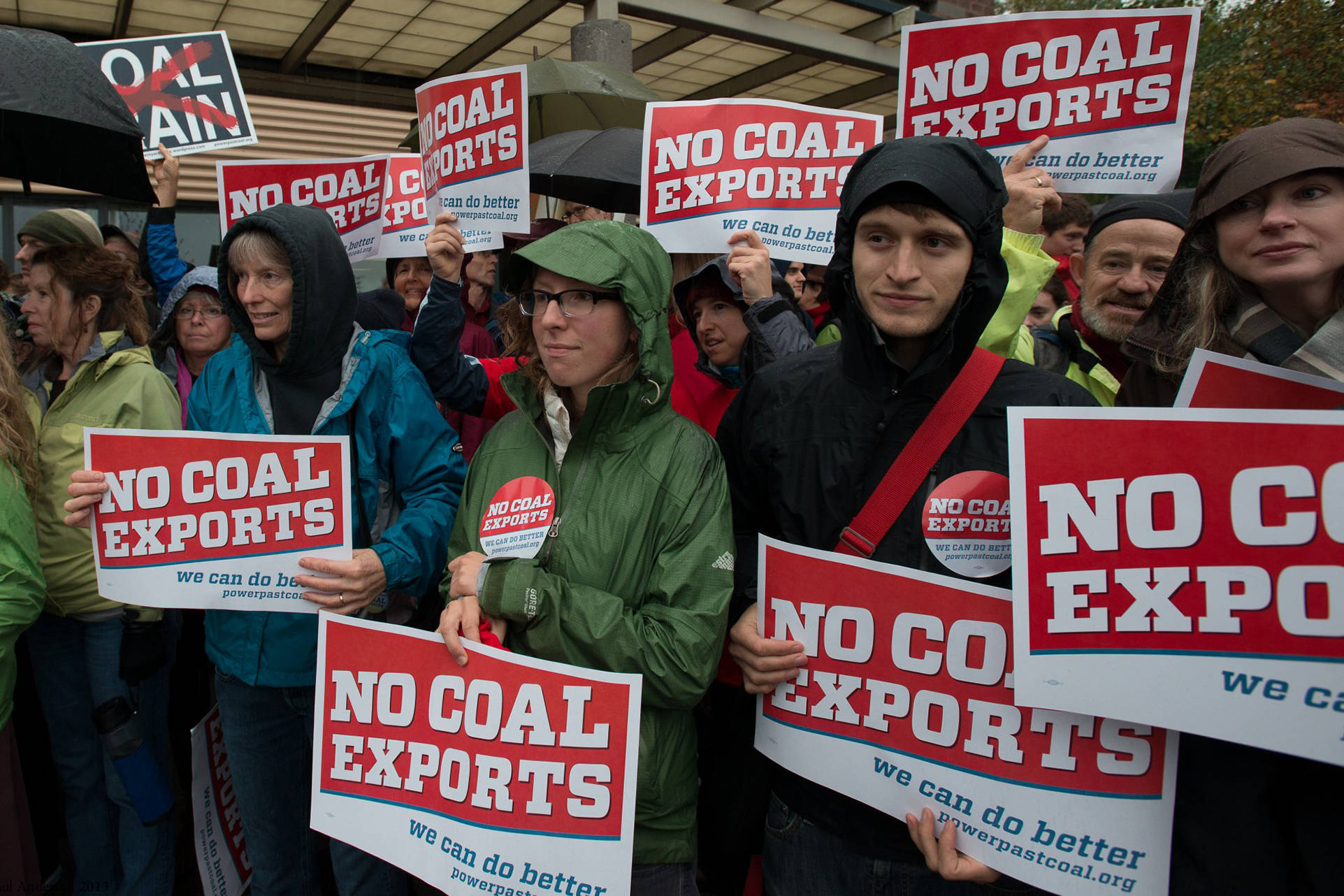A coalition of environmental, labor, public health, first responder, faith, fishing, and business groups dropped a stack of heavy boxes inside Gov. Jay Inslee’s office in Olympia on Thursday: Printouts, petitions, and signatures representing over a million public comments against coal and oil-export terminals in Washington state.
“It’s actually closer to 1.5 million,” says Rebecca Ponzio, director of the Washington Environmental Council’s Stand Up to Oil campaign. “We gathered these through the comment periods on the terminal fights; we gathered them at tabling events, at community events; we gathered them online, we gathered them through solidarity actions… People from across the region are saying, ‘No. This is not the future of the Pacific Northwest.’”
Thursday’s rally and ceremonious mic drop was indeed a “major milestone,” Ponzio says, in an anti-fossil fuel battle that’s been going on for the past seven years — and one that has, so far, been marked by win after win. Environmental advocates have dubbed the region “the thin green line” that stands between coal and oil resources in the midwest and the Washington and Oregon ports that could ship them abroad. The number of coal export proposals, for example, dropped from six to one between 2010 and 2016, thanks in part to local opposition.
But there are a few proposed projects in Washington that are still technically viable: The Tesoro-Savage oil export terminal in Vancouver, the Millennium Bulk Terminals’ coal export proposal in Longview, and two oil-by-rail terminals in Grays Harbor. Though the last few were dealt significant blows at the beginning of the year — the state Department of Natural Resources denied Millennium an important lease, then the state Supreme Court ruled the Grays Harbor proposals fall under the purview of a restrictive environmental law — they’re all still alive enough to encourage dozens of activists to pile onto the Capitol steps and make themselves heard.
As was made clear Thursday, environmentalists and tribal nations are not the only ones resisting. There are also longshore workers, physicians, small businesses, commercial fishermen, firefighters, immigrant-rights organizers, and Lutheran bishops speaking against coal and oil trains and tankers and the risks they pose.
“I’ve been a longshoreman for 25 years… and one thing I’ve learned is safety takes a backseat to production,” said Cager Clabaugh, president of the ILWU Local 4 in Vancouver, a union that opposed the Tesoro-Savage oil export proposal before the Sierra Club did. “You can point out a problem. It will not get taken care of until it is a problem. … We tell [oil and rail companies] ‘look, these trains are gonna derail, they’re gonna spill, they’re gonna explode.’ They say, ‘no that won’t happen.’ And then it happens.”
Clabaugh added with a grin that, though a longshoreman who fights for labor rights and likes hunting and fishing, he is now “getting called a ‘treehugger’ and an ‘environmentalist’ and a ‘snowflake’” for his opposition to the oil export proposal. “Hey, whatever!… You know what, snowflakes, they’re cool, they’re pretty, they make everything look better, and when you get a lot of them together they’re very dangerous. We will fight this to the end. If it doesn’t go our way, we will still fight it.”
The state Energy Facility Site Evaluation Council is expected to deliver its final recommendation on the Vancouver project to Inslee by as early as mid-June, at which point the decision to greenlight or veto it will be entirely up to him. Opponents believe that Inslee, who’s long put climate policy at the top of his political priority list, is on their side.
“There’s no possible way that our governor… will allow the shipping of these toxic substances out of our state,” said Dr. Bruce Admundson, president of Washington Physicians for Social Responsibility. “He’s our ally.”
Inslee does not have the final say on everything. A number of state agencies will have to make permitting decisions for the coal export terminal in Longview, whose final environmental impact statement was just released by the state Department of Ecology, and the City of Hoquiam will likely have the last word on the Grays Harbor proposals.
But Larry Thevik, vice president of Washington Dungeness Crab Fishermen’s Association, made sure to call out the governor, specifically. “We are calling on you to use your influence and authority to halt these projects,” he said. “Governor Inslee, we have gathered today to speak directly to you… This is a risk we do not want to take, we do not need to take, and we must not take.”
sbernard@seattleweekly.com








